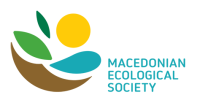Isolation of soil microorganisms and their potential applications against phytopathogenic fungi
Keywords:
soil microorganisms, antifungal activity, phytopathogenic fungi, microbial biofungicidesAbstract
A contemporary substitute that shields the environment from the widespread issue of pesticide pollution includes biofungicides, natural, environmentally friendly, and biodegradable pest management solutions that are targeted at specific pest species and do not induce resistance in their intended targets. The Republic of North Macedonia, is still reliant on imports of these bioproducts until research is done on the inherent potential of its soil micro-communities. The purpose of this study was to isolate native microorganisms that show antifungal activity, as biofungicides are ecological bioproducts. The results showed that 80% of the 116 of isolates were from contaminated soils. The highest number of bacteria was found in Rudarsko energetski-kombinat-Bitola (REK) (15.67 x 104 CFUg-1) in the summer season and the lowest number in Bucim (2.8 x 102 CFUg-1) in winter. From the results obtained during the research, it can be noted that the number of microorganisms showed great seasonal variations and was influenced by the soil type. Out of 116 bacterial isolates, 45 exhibited antifungal activity against Monilinia fructicola, Aspergillus niger and Penicillium sp. in vitro. Isolates from contaminated soils showed greater antifungal activity. Antagonists B85, B86, B87 and B88 stood out by forming the largest zones of inhibition against phytopathogenic fungi. The collected test results show that four weeks after applying the individual isolates and its consortium, there was a drop in the number of phytopathogenic fungus in the soil-filled pots. Thus, it can be concluded that the obtained results can be used for further research in order to apply these microorganisms as biological control preparations, a source of green chemicals, as biostimulators for improving soil fertility, encouraging plant growth and reducing of pesticide toxicity.
Downloads
Published
How to Cite
Issue
Section
License
Copyright (c) 2024 Sofija Kostandinovska, Marija Velickovska, Marija Nikolovska, Simeon Nikolovski, Hristina Srpcanska, Dzoko Kungulovski, Natalija Atanasova-Pancevska

This work is licensed under a Creative Commons Attribution 4.0 International License.
Macedonian Journal of Ecology and Environment applies the Creative Commons Attribution 4.0 International ![]() license to articles and supplementary material we publish. If you submit your paper for publication to Macedonian Journal of Ecology and Environment, you agree to have the CC BY license applied to your work. Under this Open Access license, you as the author agree that anyone can reuse your article in whole or part for any purpose, for free, even for commercial purposes. Anyone may copy and redistribute the material in any medium or format as long as the author and original source are properly cited. This facilitates freedom in re-use and also ensures that Macedonian Journal of Ecology and Environment content can be mined without barriers for the needs of research.
license to articles and supplementary material we publish. If you submit your paper for publication to Macedonian Journal of Ecology and Environment, you agree to have the CC BY license applied to your work. Under this Open Access license, you as the author agree that anyone can reuse your article in whole or part for any purpose, for free, even for commercial purposes. Anyone may copy and redistribute the material in any medium or format as long as the author and original source are properly cited. This facilitates freedom in re-use and also ensures that Macedonian Journal of Ecology and Environment content can be mined without barriers for the needs of research.
Author - the holder of copyrights is encouraged to sign and return the Copyright form prior to the publication of the scientific article.
Licencing:

Macedonian Journal of Ecology and Environment is licensed under a Creative Commons Attribution 4.0 International License.

